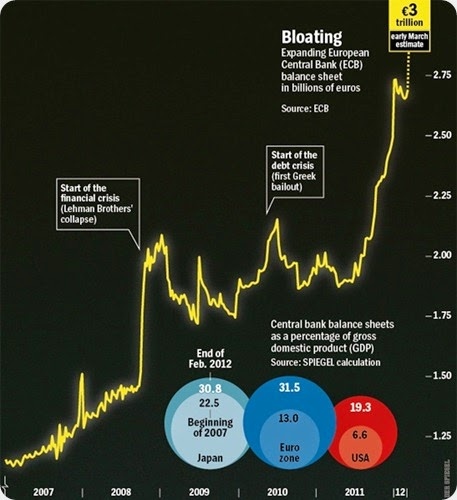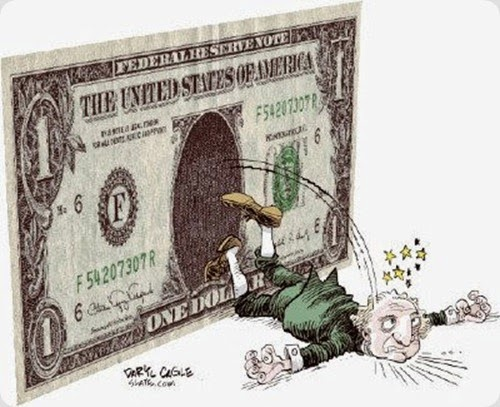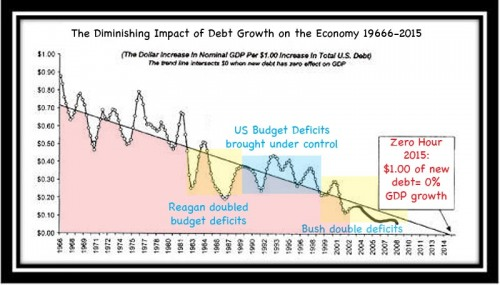
The rescue of Northern Rock, Royal Bank of Scotland and Lloyds Banking Group resulted in an increase in debt of around 4 times the existing debt, and the Bank of England increased its balance sheet by 1000% (in "only" 10 times).
Does anyone think that the UK's debt problems are easier to solve than those of, say, Spain or the Eurozone?
We are all in the same boat, which does not seem very sustainable...
The evolution of the European Central Bank 's balance sheet since 2007 has meant that it now has around 3 trillion euros on its balance sheet, the evolution has been:

El rescate de las entidades Northern Rock, Royal Bank of Scotland y Lloyds Banking Group supuso un incremento de la deuda del orden de 4 veces la existente, y el Banco de Inglaterra incrementó su balance en un 1000% (en "sólo" 10 veces).
¿Alguien cree que los problemas de endeudamiento de UK son más fáciles de resolver que los de, por ejemplo, España o la zona Euro?
Vamos todos en el mismo barco, que no parece muy sostenible...
La evolución del balance del Banco Central Europeo desde 2007 ha hecho que ahora tenga unos 3 billones de euros en su balance, la evolución ha sido:
ECB balance sheet growth 2007-2012 / Incremento del balance del BCE 2007-2012
This dynamic, particularly in the Eurozone, is also being encouraged by the countries at the "centre" of the system, in particular by Germany and France, because their banks are the most exposed to the default problems of the peripheral countries. And if we move even further away from the "surface" we arrive at the centre of the "global system", that is, the global financial oligopoly and the recipe that is being promoted is the same as that of the Asian crisis of 1998 or that of Argentina in 2001, that is, the combination of immense public aid to the financial sector, no matter how speculative its activities may have been, and at the same time brutal measures to contain public spending combined with no less brutal increases in taxes, to obtain the necessary resources for that financial sector.
Esta dinámica, en particular en la zona Euro, está siendo, también, alentada por los países del "centro" del sistema, en particular por Alemania y Francia, pues sus bancos son los que están más expuestos a los problemas de impagos de los países de la periferia, y si nos alejamos aún algo más de la "superficie" llegamos al centro del "sistema global", es decir, el oligopolio financiero global y la receta que se está promoviendo es la misma que la de la crisis asiática del 98 o la de Argentina del 2001, es decir, la combinación de ayudas públicas inmensas al sector financiero, da igual lo especulativo que hayan sido sus actividades, y al mismo tiempo medidas brutales de contención del gasto público combinadas con aumentos, no menos brutales, de impuestos, para conseguir los recursos necesarios para ese sector financiero
A bit of history. / Un poco de historia.
At this stage, we should do a little history and look back at what happened in Germany in the months following the Crash of 1929. In particular, it is worth recalling the policies of the famous Chancellor Heinrich Brüning, a notable graduate of the London School of Economics (LSE) whose policies, in order to get out of the crisis and be able to pay the foreign debt, were a brutal cut in social benefits and public spending and a no less brutal increase in taxes (does that sound familiar?). The consequences were predictable: an increase in unemployment that reached 30% of the working population and the conversion of the Nazis from a marginal group of violent thugs and lunatics to become the first political force in the country, where Hitler managed to win over the people by means of 2 bold measures = the repudiation of the foreign debt (of the Treaty of Versailles) and massive public employment that completely ended unemployment.
In reality, Hitler's rise was not due to the hyperinflation of 1923, but to the deflation and unemployment of 1931, the product of a suicidal austerity policy to pay debts, above any need of the population, and this should make politicians reconsider the current situation.
The economist J.M. Keynes was against the huge debts that the Treaty of Versailles was going to impose on the defeated countries of World War I, and so in 1918 he wrote: "We can never move again unless we free ourselves from these paper chains" (referring to the debts), and later, in 1923, he wrote: "the absolutists of contracts are the true fathers of revolutions", 10 years later, Hitler took power in Germany and in 1939 we already know what began...
Then, on the other side of the Atlantic, in 1933, Roosevelt, at the beginning of his mandate, was debating between two possible options, one of them was to send the army to shoot at the people, and the other was the New Deal, which basically consisted of copying what the Nazis were doing in Germany, that is, promoting public employment in gigantic infrastructure works, which were necessary (such as the Hoover Dam or rural electrification, or freight rail networks, etc.) in such a way that they would then be the "ferment" for the development of the country.
Because let no one be mistaken, welfare policies, in certain conditions of socio-economic deterioration, are NOT a choice, unless one assumes that a large mass of the population is going to be left in a corner hungry for bread and a future without doing anything.
The fall of Ben Ali in Tunisia, or of Mubarak in Egypt, must be understood not only in terms of the "lust for freedom", but also in terms of the real hunger of a significant part of the population caused by the end of subsidies on bread and other basic foodstuffs due to the pursuit of "liberalizing" policies promoted by the IMF and the World Bank, as a method of reducing public debt (as is being done here, for example, with unemployment benefits).
There are those who are surprised by the rise of Islamism, which is becoming more and more radical, in these countries, and it might seem that they are going "in the wrong direction" (against "freedom", for example, to die of hunger), since the alleged protests in search of "freedom" seem to end up serving the interests of groups that want to return these societies "to the 7th century". I have already written a post talking about this dynamic, and no one should be surprised if this happens, just as the case of Nazi Germany should make us think about these events.
Radical Islam places great emphasis on Islamic "values" of helping the needy, the hungry, supporting orphans, a sense of unity and community comfort, and this has and will continue to have an appeal for the growing population of poverty in these countries, just as fascism, or communism, did in Europe in the 1930s.
What we are witnessing in Spain is a global phenomenon, written in stone in the Constitutions of the different countries, and which states that the payment of debts is the first priority of the States, beyond any present or future need of the citizens of the country (as Heinrich Brüning did), and following this first maxim, the needs of the unemployed, the elderly, the sick, will be put in the background, with respect to the needs of the creditors, no matter how disastrous the living conditions of the most disadvantaged strata of the population.

Llegados a esta fase, deberíamos hacer un poco de historia, y volver la vista atrás a lo que ocurrió en Alemania en los meses siguientes al Crack de 1929, y en particular es conveniente recordar las políticas del famoso canciller Heinrich Brüning, notable licenciado por la London School of Economics (LSE) y cuyas políticas, para salir de la crisis y poder pagar la deuda externa, fueron un recorte brutal de prestaciones sociales y de gasto público y un aumento no menos brutal de impuestos (¿os suena?), las consecuencias fueron las previsibles: un aumento del desempleo que llegó al 30% de la población activa y la conversión de los nazis, de un grupo marginal de macarras y chiflados violentos, hasta llegar a ser la primera fuerza política del país, donde Hitler consiguió ganarse al pueblo por medio de 2 medidas audaces = el repudio de la deuda externa (del Tratado de Versalles) y el empleo público masivo que acabó completamente con el desempleo.
En realidad el ascenso de Hitler no fue debido a la hiper-inflación de 1923, sino a la deflación y el desempleo de 1931, producto de una política de austeridad suicida para pago de deudas, por encima de cualquier necesidad de la población, y esto debería hacer, a los políticos, recapacitar de la situación actual.
El economista J.M.Keynes, estaba en contra de las inmensas deudas que el Tratado de Versalles iba a imponer a los países vencidos de la I Guerra Mundial, y así en 1918 escribió: "Nunca podremos volver a movernos a no ser que nos liberemos de estas cadenas de papel" (refiriéndose a las deudas), y posteriormente, en 1923, escribió: "los absolutistas de los contratos son los verdaderos padres de las revoluciones", 10 años más tarde, Hitler tomaba el poder en Alemania y en 1939 ya sabemos lo que empezó...
A continuación, al otro lado del Atlántico, en 1933, Roosvelt, al inicio de su mandato, se debatía entre 2 posibles opciones, una de ellas era la de enviar al ejército a disparar contra el pueblo, y la otra el New Deal, que consistió, básicamente, en copiar lo que los nazis estaban haciendo en Alemania, es decir, promover el empleo público en gigantescas obras de infraestructura, que eran necesarias (como la presa Hoover o la electrificación rural, o las redes ferroviarias de mercancías, etc...) de tal forma que luego serían el "fermento" para el desarrollo del país.
Porque que nadie se equivoque, las políticas asistenciales, en determinadas condiciones de deterioro socio-económico, NO son una elección, a no ser que se cuente con que una gran masa de la población va a quedarse en un rincón hambrienta de pan y de futuro sin hacer nada.
La caída de Ben Alí en Túnez, o de Mubarak en Egipto, hay que entenderlas no sólo en virtud del "ansia de libertad", sino de verdadero hambre de una parte importante de la población originado por el fin de los subsidios al pan y otros alimentos básicos debido al seguimiento de las políticas "liberalizadoras" promovidas por el FMI y el BM, como método de reducir el endeudamiento público (como aquí se está haciendo, por ejemplo, con el subsidio al desempleo).
Hay quien se sorprende del auge que está tomando el islamismo, cada vez más radical, en esos países, y pudiera parecer que van "en la dirección errónea" (contra la "libertad", por ejemplo de morirse de hambre), ya que las presuntas protestas en busca de "libertad" parece que acabarán sirviendo a los intereses de grupos que quieren volver a esas sociedades "al siglo VII", ya he escrito un post hablando de esta dinámica, y nadie debería de sorprenderse de que eso suceda, como el caso de la Alemania nazi debería hacer recapacitar sobre estos sucesos.
El islamismo radical hace mucho hincapié en los "valores" islámicos de ayuda al necesitado, al hambriento, de apoyo a los huérfanos, del sentido de unidad y de consuelo de las comunidades, y esto tiene y tendrá un atractivo para la creciente población en la miseria de esos países, como lo tuvo el fascismo, o el comunismo, en los años 30 del pasado siglo en Europa.
Lo que estamos observando en España es un fenómeno global, inscrito con letras de fuego en las Constituciones de los diferentes países, y que reza que el pago de las deudas es la primera prioridad de los Estados, más allá de cualquier necesidad presente o futura de los ciudadanos del país (como hizo Heinrich Brüning), y siguiendo esta primera máxima, las necesidades de los parados, los ancianos, los enfermos, quedarán en un segundo plano, respecto a las necesidades de los acreedores, sea cual sea lo desastroso de las condiciones de vida de los estratos más desfavorecidos de la población.
Is this really a sensible goal for a country's democratic rulers? / ¿Es esto, de verdad, un objetivo sensato para los gobernantes democráticos de un país?
That is to say, we are witnessing a transfer of wealth from the poorest to the immensely rich such as has never been seen in the recent history of modern society, and I do not know if there are other examples in the history of humanity.
But none of this is going to work, nor can it work, because the measures adopted, by their own internal logic, cause a further deterioration of economic conditions that causes debts to increase, rather than decrease, and bankruptcy is inevitable, albeit in the midst of impressive pain and destruction.
Do the big speculators really believe that they can condemn all of humanity to lifelong impoverishment and slavery? I believe they are convinced that it is possible, with the invaluable help of the generally corrupt political "caste."
A symptom of the evolution of the activity of the financial world from its "theoretical" aspect of promoting the efficient allocation of resources for the productive economy, to its current mission of "extraction of rents", is the comparative trend of indebtedness and GDP growth, for example in the case of the USA:
As can be seen, each additional dollar in debt, over time, in constant value, has increasingly less "efficiency" in increasing GDP (as a measure of wealth), and we are reaching a level where no increase is obtained, since an ever greater percentage of the wealth generated is destined to pay off commitments due to the dynamics of debt.
This situation is therefore "game-over" and means the end of the "carrying capacity" of the system, which is no longer able to pay off the debts incurred.
Foreign Minister García-Margallo admits that in 2014 the State will need to allocate 38 billion euros to pay the interest on the public debt, in addition to reducing the deficit that the government has committed to. What kind of cuts will be necessary to pay all that money? Better not think about it...
It must be said that, for example, the "rescue" of financial institutions in the USA was met with considerable opposition, and in the opinion polls that were carried out at that time (late 2008) it was revealed that more than 50% of Americans were against this aid to Wall Street "under any circumstances", that is, under no circumstances, even if this meant the loss of deposits or retirement plans, that is, war, because sometimes there are moral aspects.
They are "non-negotiable", just as, for example, Japan's declaration of war after Pearl Harbor was non-negotiable for them, regardless of the cost-benefit assessments that could be made in those circumstances; or the position of the British in 1939-1940.
It must be taken into account that the difference between a looting and a war is that in war there is opposition...
Once the major bank bailouts in the USA were carried out, the behaviour of the banks has NOT changed in the slightest and they continue with their same speculative activities, reinforced now by the new feeling of invulnerability post-Lehman Brothers. Thus, the "alleged" change brought by Obama has been a pure hoax, since among the economic leaders of this kind of coloured "Messiah" there are more former leaders of Goldman-Sachs and the rest of the big Wall Street banks than in the time of the (rightly) maligned GWBush.
There are those who argue (like Paul Krugman) that what should be done is to increase public spending much more, but without reaching a large increase in inflation, in a classic "Keynesian" exercise. I and many others believe that this only increases the current dynamic of transferring private to public debt, and the burden on future generations, and will not be a solution.

Es decir, estamos asistiendo a una transferencia de riqueza desde los más pobres a los inmensamente ricos como no se ha visto nunca en la historia reciente de la sociedad moderna, y no sé si hay otros ejemplos en la historia de la Humanidad
Pero nada de esto va a funcionar, ni puede funcionar, pues las medidas adoptadas, por su propia lógica interna, origina un deterioro adicional de las condiciones económicas que hace que las deudas aumenten, en vez de disminuir y la bancarrota es inevitable, eso sí, en medio de un dolor y una destrucción impresionantes.
¿De verdad los grandes especuladores creen que podrán condenar a toda la humanidad a un empobrecimiento y una esclavitud de por vida? Creo que están convencidos de que es posible, con la inestimable ayuda de la generalizadamente corrupta "casta" política.
Un síntoma de la evolución de la actividad del mundo financiero desde su faceta "teórica" de promover la asignación de recursos de forma eficiente para la economía productiva, a su misión actual de "extracción de rentas", es la tendencia comparada del endeudamiento y el crecimiento del PIB, por ejemplo en el caso de USA:
Como puede verse, cada dolar adicional en endeudamiento, con el tiempo, en valor constante, cada vez tiene una menor "eficiencia" en hacer crecer el PIB (como medida de la riqueza), y estamos alcanzando un nivel en que no se obtiene ningún incremento, pues cada vez mayor porcentaje de la riqueza generada se destina al pago de los compromisos debido al endeudamiento, dinámica.
sta situación es, pues de "game-over" y supone el fin de la "capacidad de carga" del sistema, que ya es incapaz de amortizar las deudas contraídas
El ministro de Exteriores García-Margallo reconoce que en 2014, el Estado necesitará destinar 38.000 millones de euros para pagar los intereses de la deuda pública, además de bajar el déficit a que se ha comprometido el gobierno. ¿Qué clase de recortes serán necesarios para pagar todo ese dinero? Mejor no pensarlo...
Hay que decir que, por ejemplo, el "rescate" de las entidades financieras en USA tuvo bastante oposición, y en las encuestas de opinión que se hicieron en esos momentos (finales de 2008) se puso de manifiesto que más de 50% de los americanos estaban en contra de esas ayudas a Wall-Street "under any circumstances" es decir, bajo ninguna circunstancias, aunque esto significase la pérdida de los depósitos o del plan de jubilación, es decir, la Guerra, pues en ocasiones los aspectos morales.
Son "innegociables", como, por ejemplo fue innegociable para ellos la declaración de guerra Japón tras Pearl-Harbor independientemente de las valoraciones de coste-beneficio que se pudiesen hacer en esas circunstancias; o la postura de los ingleses en 1939-1940.
Hay que tener en cuenta que la diferencia entre un saqueo y la guerra es que en la guerra hay oposición...
Una vez efectuados los grandes rescates bancarios en USA, el comportamiento de los bancos NO ha cambiado lo más mínimo y siguen con sus mismas actividades especulativas reforzadas ahora por la nueva sensación de invulnerabilidad post-Lehman Brothers y así, el "presunto" cambio que traía Obama, ha sido un puro camelo, pues entre los responsables económico de esta especie de "Mesías" de color, hay más antiguos responsables de Goldman-Sachs y del resto de grandes bancos de Wall Street que en la época del denostado (con razón) G.W.Bush.
Hay quien defiende (como Paul Krugman) que lo que debe hacerse es aumentar el gasto público muchísimo más, pero sin llegar a un gran aumento de la inflación, en un ejercicio "keynesiano" clásico. Yo y muchos otros creemos que eso no hace sino aumentar más la dinámica actual de transferencia de deuda privada a la pública, y la carga sobre las generaciones venideras y no será ninguna solución



El presente artículo puede haber sido publicado parcial o totalmente en algunos de mis blogs.
This article may have been published in part or in full on one of my blogs.
Mis Blogs y Sitios Web / My Blogs & Websites:
- La Cucina di Susana.
- Cucinando con Susana
- El Mundo de los Postres
- Crónicas de Un Mundo en Conflicto.
